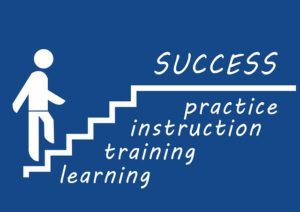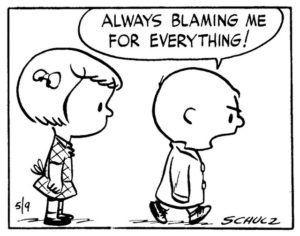Usually on Writing and Wellness, we focus on how writers and other creatives can encourage, support, and pump themselves up.
We’re our own worst critics, and typically we need to pat ourselves on the back more than we need to kick ourselves in the backside.
Writers are humans too, though, and sometimes, we can slack off a bit too much, or go a little too easy on ourselves.
Could this be what’s happening to you lately? Could it be that instead of more positive affirmations or morning meditations what you really need is the equivalent of a Marine drill sergeant bellowing in your ear?
Here’s how to tell if it’s time to give your inner writer a little—or a lot—of tough love.
 1. You haven’t kept up a regular writing routine for two months or longer.
1. You haven’t kept up a regular writing routine for two months or longer.
We all know that life happens. Family issues, health problems, the death of a loved one, financial strain, and more can all interfere with our writing goals, and can derail even the best laid plans for regular writing.
Most of the time, it’s best to be kind to yourself, let it go, and keep trying on a daily basis. But if you’ve gone for a couple months without being able to get a regular writing routine going again, it may be time for some tough love. If things are still disastrous in your life, maybe not, but be honest with yourself. Have you just gotten out of the habit? Are you letting fear hold you back?
It can be particularly difficult to settle into a routine again after you’ve been away from it for a while.
“I’ve known writers who hit their stride, were interrupted for one reason or another, and then days turned into weeks turned into months and they were never able to get back in the saddle,” says author Nathan Bransford. “All that work was squandered. Breaks = kryptonite Achilles heel termite ridden ankle breaking weakening things. Don’t let long breaks destroy you!”
The only person who’s going to get you back on the horse is you. If you’re too easy on yourself, you’ll keep flipping pages on the calendar while getting nothing done. How much of your life are you willing to let pass you by before you devote yourself again to your passion?
Whatever’s holding you back, channel your inner strict parent, set a time, and sit down with your favorite writing tool. Don’t allow any excuses. Best tactic I’ve found? Promise yourself you have to write for only five minutes. Stick with that for a few days, and you’ll likely find your stride again.

2. You’re just not feeling it.
This is a tricky one. Sometimes losing that lovin’ feeling can signify that the project you’re working on is not the right one, or that you’re in a rut, and need to break out to stimulate your creativity again.
If the muse has left you, we have some tips here that may help you get her back into your life. But watch out—many times this sort of phase simply means that you need to get down and dirty with your writing.
Seasoned writers know that the job is not all creative bliss. Particularly when we’re in the middle of a novel, or on the second or third or fourth edit, it gets downright hard. Working on the piece is real work. Whereas that first draft may have felt heady and exciting, subsequent drafts can feel like you’re trudging along through a swamp with your boots full of mud.
“But the middle, man, the motherfucking middle,” says novelist and screenwriter Chuck Wendig. “It’s like being lost in a fog, wandering the wasteland tracts.”
“No one ever said writing was easy,” says Whitney Faber in The Writer. “In fact, good writing can be downright laborious.”
“Many people don’t write a book because it’s extremely hard,” says Brian Klems, online editor of Writer’s Digest. “Forcing yourself to sit down, brainstorm, write, edit, rewrite, edit, cut, add, rewrite, workshop, rewrite and rewrite some more until you’ve got somewhere between 50,000 and 100,000 words is grueling work. Most can’t do it.”
Could it be that you’re lack of progress could be blamed on…ahem, a bit of laziness? Likely you have a lot of other things you’re doing in your life. Odds are you aren’t coming to the keyboard fresh from weeks of vacationing. You may already be tired, stressed, and in dire need of some sleep.
If an honest reflection shows that you’re “not feeling it” because your project is requiring more work than you hoped, it’s time for a little bit of tough love. Your writing means a lot to you, right? Try to remind yourself of that, tell yourself you can do it, and get back to work. If you must, withhold that special reward until you’re finished!
 3. You’re blaming everyone else for your lack of progress.
3. You’re blaming everyone else for your lack of progress.
I’ve seen writers at conferences who are convinced that everyone in the publishing industry is an idiot. Editors don’t know what’s good. Agents are jaded. The market is oversaturated, leaving no room for new artists. Even gifted, talented writers simply have no shot at making it.
No one in this business would deny how tough it can be. We all complain now and then, just to blow off a little steam. But if you find yourself blaming everyone else for your lack of progress as a writer, it’s time to step back and take a second look.
“I spent so much of my time writing, but never improved,” says writer and musician J. Kent Messum. “I was rehashing the same shit, making the same mistakes over and over again, convinced of my talent, positive that my amazing skills would soon be noticed by the powers that be. I didn’t want to have my work criticized. I didn’t welcome the opinions of others. A word to the wise wasn’t allowed in my house. I just wanted agents and publishers to read my stuff and recognize my brilliance.”
It wasn’t until years later, when he met his mentor, that Messum says he realized what he didn’t know:
“In truth, I was terrible. My style was long-winded and pretentious. I forced the use of complex words, too large and improper in the context of my writing. My prose was bloated, my storytelling weak. I was so wrapped up in my own perceived awesomeness that I was blind to all my faults.”
Writers need to have a good dose of self-confidence to keep going despite all the obstacles in our paths. But at the same time, we have to be willing to learn, grow, and improve. If you’re not where you’d like to be, whatever that means to you—byline, publishing contract, healthy sales—and you’re blaming everyone else, apply some tough love as you look in the mirror.
There are two benefits to this. One, you’ll likely find some things that do need improving about your writing, and you can work on those to hopefully gain traction on your goal. Two, you’ll put the control back in your own court.
When you blame everyone else, you take the responsibility off yourself, but you also rob yourself of your own power. Realizing that you may still have shortcomings empowers you to attack those shortcomings and whittle them down until your writing shines even brighter than before.
 4. Your book isn’t selling as well as you hoped.
4. Your book isn’t selling as well as you hoped.
Here again, this is a tricky one, as obviously much of this is out of your control. You can’t predict how the market will react to your book, and it is true that there are more books out there than ever before for consumers to buy, making it more difficult for any one book to hit the bestsellers lists.
It’s also true that there are more adults who don’t read than there used to be. According to a 2014 article in The Atlantic:
“Without question, the American bookworm is a rarer species than two or three decades ago, when we didn’t enjoy today’s abundance of highly distracting gadgets. In 1978, Gallup found that 42 percent of adults had read 11 books or more in the past year (13 percent said they’d read more than 50!). Today, Pew finds that just 28 percent hit the 11 mark.”
Meanwhile, publishers have less money to spend on marketing for authors, and self-published authors either need to foot the bill for a publicist (which is often expensive), or do the work themselves. And truly, becoming a good salesperson is like learning an entirely new profession.
If you haven’t been doing your share of marketing, however, you may want to think twice about what you really want from your writing career. Says freelance writer Crystal King:
“In case you’ve been living under a rock, the world of publishing is in a bit of an uproar….These days, even if you do have a book contract, there is very little, if any, money going to authors to help them sell books. Plus there’s the fact that it’s becoming increasingly difficult to get your book noticed in a world of mass information and digital and technological noise.”
So what to do? Decide. If you’re not going to spend much time marketing, then realize your sales will probably reflect your effort.
“This is where I think authors need a little tough love,” says King. “Don’t complain about the pittance in sales your book has had when so much of the responsibility—and opportunity— lies in your own two hands.”
Of course we all have a lot on our plates. But guest posting, staying active on your social media accounts, and tackling one or two other marketing activities—whatever works best for you—can help increase sales, and again, will put the ball back in your court.
Try sitting down and tackling the issue with a calendar nearby. Can you do at least one guest post a month? Run one giveaway per quarter? Do a signing or other event 2-3 times a year? Creating a calendar gives you an action plan that you can then follow through on, which is likely to give you better results than you’d get doing nothing at all.
And don’t forget to keep writing. Your next book is often your best marketing plan for your last one.
“It typically takes FIVE books to start making a living on your work,” says author Rachel Thompson. “FIVE. (Says who? Almost every writer who is making a living on their books —Steena Holmes, Bette Lee Crosby, Ryne Pearson, Liz Schulte, Hugh Howey, and on it goes).”
 5. You’re letting the industry get you down…and keep you down.
5. You’re letting the industry get you down…and keep you down.
We’ve all been there, and we’ll likely all be there again.
You know. That place of discouragement, despair, and “why do I keep doing it?” place. The whiny, I need my mom place.
It’s okay. This is a tough industry. It’s bound to get us all down a time or two…or ten.
“I don’t know too many authors who think this job is a cake walk,” says author and freelance writer Linda Yezak. “It’s hard. It fosters fear and insecurity. For many–if not most of us–it keeps us humble.”
But if you’ve allowed yourself to wallow in the self-pity pool for more than a couple weeks or so, it may be time for some tough love. This is your life. You are the captain of your ship. Where are you steering it next? Are you allowing the winds and the tides to toss you about until you simply float, rudderless, or will you step up and regain control and use your strength and determination to take you where you want to go?
“We all like the pat on the back and the positive reinforcement,” says mystery author and “Funds for Writers” guru Hope Clark. “That’s human nature. But if you need someone petting you on the head every day to keep going, maybe this isn’t the job for you. There are too many others out there who show up everyday to make their dream happen. And they left their mommas in the other room.”
Tough? Maybe. But sometimes that’s just what we need.
I enjoy encouragement and support just as much as the next writer. But I’m also a sensitive soul who takes setbacks to heart. I’ve learned over the years that the only solution for me is tough love, and I learned that from author and writing instructor extraordinaire Steven Pressfield.
If you need a good kick in the seat and you know it, I highly recommend you buy Steven’s book, The War of Art. It’s one of the greatest gifts I ever got myself, and I continue to refer to it often.
For now, let me leave you with this quote from the book, and an encouragement—if you’re struggling with your creative career and nothing seems to help, stop being a victim. Take on the role of tough coach, and don’t accept anything less than full-on effort, starting immediately.
“…the most important thing about art is to work. Nothing else matters except sitting down every day and trying.
Why is this so important?
Because when we sit down day after day and keep grinding, something mysterious starts to happen. A process is set into motion by which, inevitably and infallibly, heaven comes to our aid. Unseen forces enlist in our cause; serendipity reinforces our purpose.”
Has tough love worked for you as a writer/artist? Please share your thoughts.
Blame cartoon photo credit: Tom Simpson via Foter.com


Such a great post. Thanks os much for sharing it.
I love that last encouragement 🙂
Good article. Thanks for including me in it!